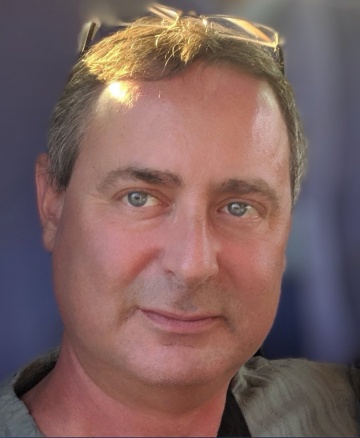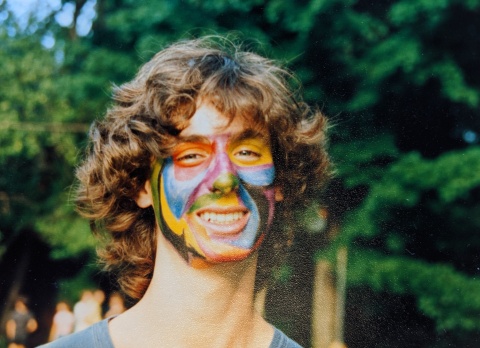Columbia College | Columbia University in the City of New York
Take Five with Martin Benjamin ’90

What were you like when you arrived at Columbia?

Benjamin in 1986
What do you remember about your first-year living situation?
I showed up at the College with a couple of suitcases and about $300 in cash from my summer job. Boy, did that money go fast — books, a few slabs of pizza, some bagels, more books. Thankfully, most food was covered in the meal plan, which was covered by financial aid. I quickly found a work-study job in the Department of Spanish and Portuguese, but it was several weeks before the first paycheck arrived. Meanwhile, not having parents to call on (allude to sad childhood story here), cash ran toward zero. A floormate from Jay 11 saw me getting drenched walking to class in a storm, and bought me an umbrella. (This was before George Costanza taught us that we could just get them for free at Tom’s in those metal cans (Seinfeld, Season 8, Episode 7).) The trip leader for an Urban New York outing dug into her own pocket when I tried to pull out for lack of subway fare. Most of the other students on my floor didn’t find it worth returning the cans from the sodas we got with the meal plan, so I put big bags outside my door at the end of the hall, and the nickels added up. My first paycheck in October let me breathe. After taking a lifeguarding class for the gym requirement, I was able to get my head above water with a second job at the pool in the spring. Those first few weeks, the closest I’ve ever come to financial rock bottom — albeit with food and shelter guaranteed — lent a bit of empathy for the much more extreme situations I would later encounter during research in rural Tanzania. I wish every politician could have such an experience before they ran for office.
What Core class or experience do you most remember, and why?
The Core class that injects itself most into my daily life is Logic & Rhetoric, which made me into a much better writer for suffering through it. The hands-down most memorable class, though, was East Asian Art Hum. I also took regular Art Hum, but as a straight Western white male marching through a largely straight Western white male oeuvre, I kept wondering about the artistic experiences of the rest of everybody. The East Asia option was fantastic. The prof had connections at the Met. After she took the whole class there for a private tour of the East Asian collection, she arranged for me to have special access to inspect some of the ancient pottery for my term paper. The pieces I handled date back thousands of years. Running my hands up and down, in and out of the pots, I could feel fingers from the distant past pressing into the clay. The paper I wrote disappeared along with the floppy disc on which it was saved, but the sparks of connection with people from so long ago and so far away remain indelible.
Did you have a favorite spot on campus, and what did you like about it?
One evening of sophomore year, while looking for a way not to go back to an awful roommate scene at East Campus, I pushed on a door at St. Paul’s Chapel. Surprisingly, the door swung open. I wandered around admiring the architecture in whatever dim illumination there was. When it was clear I was alone, I let out a whistle. The whistle came back in a shimmering echo. I whistled a bit of a melody, and back it came, from all directions. I riffed, the sound reflected, again and again. Spent well over an hour whistling old tunes and improvising new ones, with the chapel enhancing every note. Never else have I found such a perfect acoustic space — the sound still lingers in my ears.
What, if anything, about your College experience would you do over?
I would untake Japanese, as it was taught at the time. Along with a highly reputed anthropology department, the chance to take Japanese was one of my initial draws to the College. I fulfilled my language requirement with a course to confirm my Spanish chops, then enrolled in the five-credit intro to Japanese course as a first-semester sophomore. Of 13 students, 11 were from a Japanese background, mostly male, and the teacher was a demure young woman. It soon became clear that the heritage learners had already picked up the basics of the language from their family environments, and they didn’t want to waste time with the ABCs (so to speak). The instructor yielded to their lead, leaving the two of us novices to memorize vocabulary without much sense of how the words were meant to form coherent thoughts. I somehow slipped through with a B. A few years later, what I retained from the class couldn’t buy me a cup of coffee on a visit to Tokyo. The main lesson that stuck with me was how not to teach a language. I was able to put that to use teaching Swahili at Yale and Wesleyan, and I’m pushing toward release for languages that have even fewer curricular resources than Japanese had back in the day.
More “Take Five”
- 1 of 32
- ›

